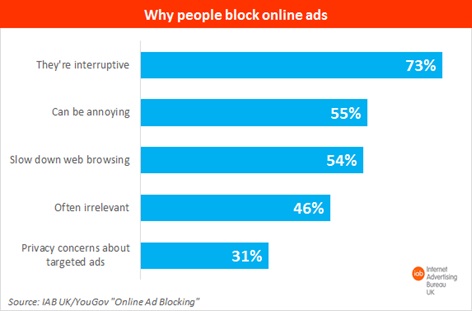Almost one in seven (15%) British adults online are currently using ad blocking software – mainly because they find online ads interruptive or annoying, according to new research.

The Internet Advertising Bureau UK Ad Blocking report, conducted by YouGov, indicates that over one in five (22%) admitted having downloaded the software at some point.
Key findings:
• More prevalent among men and 18-34 year olds
• Only half of ad blockers do so primarily to block all ads
• Main motivation is to block ‘interruptive’ or ‘annoying’ ads
• Nearly half of adults online unaware that ads fund content at little or no cost
Nearly half of adults online unaware that ads fund content at little or no cost
Men and 18-34s most likely to block ads
Men (22%) are currently more than twice as likely to block ads as women (9%). It’s most prevalent among 18-24 (34%) and 25-34 year olds (19%). Regionally, people in the North and Scotland (both 19%) are the most likely to be doing so.
Only half do so primarily to block all ads
However, only just over half (52%) of those who’ve used the software said their main motivation was to block all ads; 12% said it was to block certain types of ads, 11% say only to block ads from certain websites.
Ads are most likely to be blocked because they interrupt what people are doing (cited by 73%) or the design is annoying (55%) – e.g. bright colours, pop-ups etc. Over half (54%) do so because ads slow down their web browsing experience. Nearly half (46%) say it’s because the ads aren’t relevant.
Large numbers unaware ads fund free content
Less than half (44%) of British adults online are aware that most websites are free – such as social networks, email, news, music streaming services – because they’re funded by advertising. Thus, when an individual blocks ads, the site doesn’t receive ad revenue for that user.
Men (52%) are much more likely to be aware of this than women (36%). Awareness also decreases with age – from 59% of 18-24s to 36% of people 55+.
However, only 10% are less likely to block ads after being made aware that ads fund free content.
Two-thirds (66%) of all respondents would still prefer to access free content and have no ads. Only one in five (21%) prefers free content in return for having ads. Just 3% would prefer to pay for content in return for not having ads.
“When it comes to a free and an ad-free internet, a lot of consumers want to have their cake and eat it,” said IAB’s CEO, Guy Phillipson. “However, those unaware that most online services are free – or cost very little – because sites make money from showing visitors ads, could be in for a shock if websites start charging for access because ad blocking reduces their revenue from advertising.
“The bottom line is that if the web didn’t have ads, most sites could only exist by charging subscriptions.”
Among those currently using ad blocking software, 80% are doing so on laptops, 46% on desktop PCs. Less than one in five (19%) is blocking ads on tablets or mobiles.
Methodology
YouGov’s total sample size was 2057 adults. The survey was conducted online between 9-10th June 2015. The figures have been weighted and are representative of all GB adults (aged 18+).ᐧ
